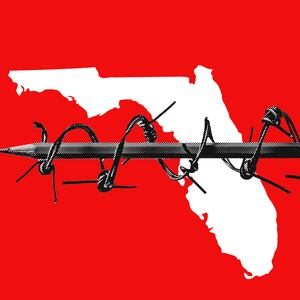On Tuesday, Florida Gov. Ron DeSantis announced a broad outline of legislation that would enact the most draconian restrictions on public higher education institutions in the United States.
Among its many pernicious features, the proposal would hand control of the core curricula at Florida’s universities to a single system-wide board appointed by the governor; ban critical race theory (CRT) and diversity, equity, and inclusion initiatives (DEI) at universities by legislative fiat; and give boards of trustees unchecked power to hire and fire faculty, effectively ending tenure protections.
It would also unilaterally rewrite universities’ mission statements and force colleges to deprioritize majors deemed to further a “political agenda.” And it would “overhaul and restructure” New College of Florida, whose new board of trustees, stacked by DeSantis with out-of-state conservative pundits, on Tuesday fired the college president and replaced her with a political ally of the governor.
If anyone’s shocked by these events, they shouldn’t be. They’re merely the most recent efforts in an intensifying campaign by some conservative state lawmakers to undermine the autonomy of public colleges and universities through viewpoint-based government restrictions on speech.
Seven state governments have already enacted educational gag orders restricting college teaching about race, sex, gender, and American history. Now, it seems, elected officials aim to seize control of the inner workings of public colleges themselves—and in so doing, risk making campuses even more inhospitable to free expression.
In a recent op-ed in The Federalist, Heritage Foundation fellow and former Department of Education official Adam Kissel offered a roadmap for lawmakers seeking to dictate institutional priorities. Kissel urged state legislatures to “fill the gap” left by public universities by setting university decisions at the curricular and program levels, banning critical race theory and other ideas, and acting to “close unserious departments, end lower-priority programs, and stop teaching frivolous courses across the board.”
In keeping with Kissel’s advice, last year legislatures attempted to defund the University of Wyoming’s gender studies program, established a task force in Louisiana to consider restricting faculty tenure, and passed a law forcing all Florida public universities to seek new accreditation agencies.
This year, Texas Lt. Gov. Dan Patrick urged the legislature to end tenure for new university hires, revoke it for current faculty who teach critical race theory, and restrict the role of faculty senates in university governance. A separate Texas bill would ban college DEI initiatives. A North Dakota bill would restrict faculty tenure, while bills in Iowa and Mississippi would end it entirely. And new anti-DEI model legislation proposed by the conservative-leaning Manhattan Institute would, among other things, allow colleges to be sued by their own alumni merely for mentioning that they support “social justice.”
Free speech advocates should vehemently oppose such political interference in the governance of colleges and universities—regardless of what they think of tenure, DEI or CRT. The institutional autonomy of public higher ed institutions is a necessary prerequisite for a climate of open inquiry on campus.
As PEN America and the American Association of Colleges and Universities wrote last June, it is vital that “colleges and universities are self-governed and self-regulated” according to principles such as “shared governance, which ensures the appropriate inclusion in institutional decision-making of members of the governing board, administration, faculty, staff, and student body.”
Legislatures do play a role in shaping public colleges, largely by setting funding priorities through the budgeting process. But by design, they have delegated most university decisions to independent, nonpartisan governing boards that in turn share their decision-making power with stakeholders across campus.
This division reflects long-established precepts that insulate the American academy from excessive political interference and manipulation, of the type that has restricted academic freedom in universities including (but not limited to) Hungary, Brazil, Russia, and China. Given the current partisan climate in the United States, legislatures that go beyond those limitations—ones which openly censor ideas, curricula, and university programs in order to advance an ideological agenda—are effectively chilling speech and silencing academic debate.
Colleges haven’t been perfect when it comes to defending free speech. Too often, some students, faculty, and administrators harbor a censorious hostility toward instructors and speakers who bring viewpoint diversity, just as some conservative critics have claimed.
Others have at times unnecessarily pitted the goal of inclusion against free speech and academic freedom, failing to see how these principles can be mutually reinforcing, and foreclosing the space for nuance when it comes to campus free expression protections. It doesn’t help that many universities fail to safeguard academic freedom for contingent and non-tenured faculty, as a recent controversy at Hamline University underscores.
But the solution to these problems is to educate campus leaders more thoroughly on free speech issues, not to subject public colleges to politically-motivated government overreach.
At its best, higher education is one of the last bastions of free inquiry and open conversation in our increasingly polarized society, a place where young people of different backgrounds and persuasions can come together to learn about the world around them.
“The dependence of a free society on free universities…means the exclusion of governmental intervention in the intellectual life of a university,” wrote Supreme Court Justice Felix Frankfurter in 1959. Any alternative, he added, “would imperil the future of our Nation.”
More than 60 years after these words were written, they remain true. Attacks on the autonomy of colleges and universities constitute a crisis of campus free expression and of the democracy it serves. We should vigorously defend the independence of American higher education from political interference from any side, while encouraging colleges and universities’ continued improvement and reform. Otherwise, the future of our nation is in grave peril indeed.
Jeremy C. Young is Senior Manager of Free Expression and Education at PEN America.










